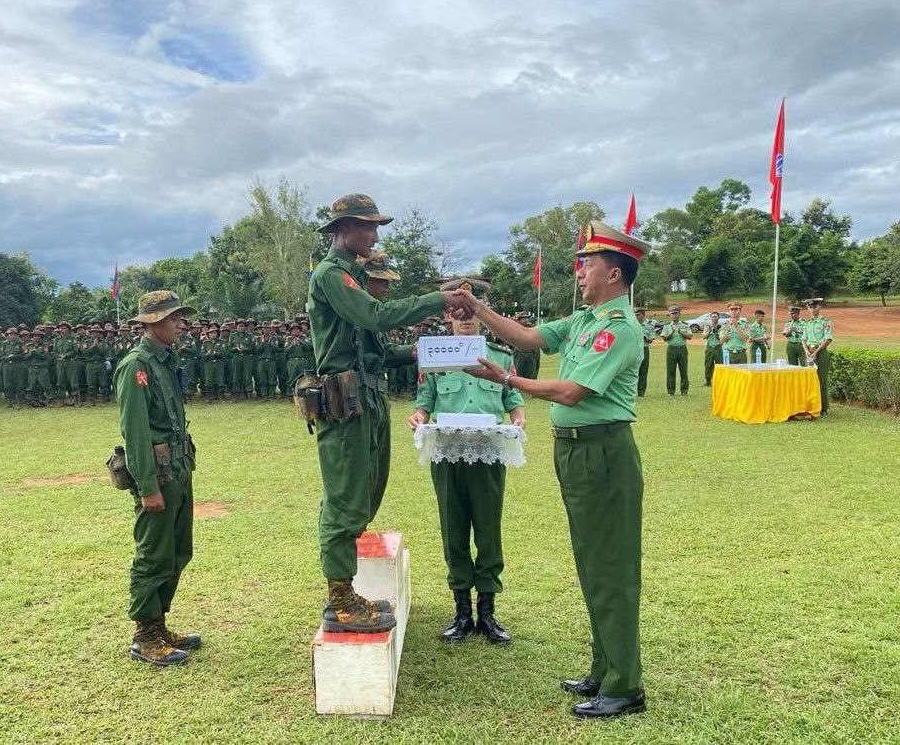Myanmar’s military junta announces census ahead of elections, yet another farce
The generals propose to collect data in the first half of October to hold a general election in November 2025. Observers view this as an attempt to show that it still controls the country. In fact, the military controls less than 20 per cent of the territory while tensions with China have also increased.
Yangon (AsiaNews/Agencies) – Myanmar’s military junta today announced plans for a countrywide census next month. General Min Aung Hlaing, Commander-in-Chief of Defence Services, said that the data collected between 1 October and 15 will be used to “correct and accurate voter lists which is a basic need for successfully holding a free and fair multi-party democratic general election,” most likely in November 2025.
This is not the first time that the junta has offered to hold a general election, a move seen more as farce since the civil war rages on in much of the country, with scores of parties dissolved, including Aung San Suu Kyi's National League for Democracy (NLD), which was in power before the 2021 coup, officially for not registering in time, state media reported.
The reality is that the military is unable to maintain control over the entire country and the election announcement, according to many observers, is meant to make people believe the opposite.
A report published in May by the Special Advisory Council for Myanmar, an independent group of experts, shows that the military is in permanent control of only 14 per cent of the country’s territory, against to 34 per cent by the resistance forces.
Several areas along the borders are now run by ethnic militias together with the People's Defence Forces (PDFs), the armed wing of the exiled National Unity Government (NUG), made up mostly of former NLD lawmakers.
“The junta has the intention to carry out a sham election and using the excuse of a census, they are collecting information from people which they will use to terrorise them," NUG spokesperson Kyaw Zaw said.
Last month, the junta-controlled media reported that the Chinese government would provide the necessary assistance to conduct the census.
It is certainly true that Beijing maintains close ties with the junta. Last week, China’s new ambassador to Myanmar, Ma Jia, met with Defence Minister General Tin Aung San to discuss military cooperation. Ma began her tenure only in mid-August.
Several ethnic militias fighting the military are also beholden to China. The secretary general of the Ta'ang National Liberation Army (TNLA) said that he had received a letter last week from China calling for an end to fighting against Myanmar soldiers in the northern areas of Shan State along the Chinese border.
The City Security Commission in Ruili, a major Chinese trading hub on the border with Myanmar, sent the letter warning that if fighting continues, all necessary steps will be taken to prevent attacks against the lives and property of Chinese nationals. “The TNLA must take responsibility for all the consequences,” the letter read.
From 27 to 29 August, the People's Liberation Army of China held military exercises along the border between the two countries.
Yet, “China will continue to play a constructive role for Myanmar’s peace and reconciliation process and promote the de-escalation in northern Myanmar,” China’s Embassy in Yangon told local media.
The TNLA is part of the Three Brotherhood Alliance, a coalition of three ethnic militias that launched an offensive against Myanmar forces in October last year, and today controls cities along the main trade routes with China.
This is China's main concern, namely ensuring that the flow of goods between the two countries is not interrupted and that the projects of the Belt and Road Initiative continue.
Launched in 2013, the latter is a mega infrastructure plan designed to connect China to Africa and Europe, in Myanmar’s case, through the Indian Ocean.
In recent weeks, tensions have risen between General Min Aung Hlaing, who rejects any kind of compromise or ceasefire with ethnic militias, and China, which, in recent years, has sold weapons worth thousands of dollars to the military regime.
According to General Min Aung Hlaing, the army pulled back from northern Myanmar because of Chinese-made drones used by ethnic militias.
In response, Beijing has accused the junta’s strongman of “betrayal” for not following up on its mediation proposals. Discontent appears to be growing even within the junta over the way the conflict is being handled, with rumours circulating in mid-August about a possible putsch.
On 15 August General Min Aung Hlaing hurriedly met with Chinese Foreign Minister Wang Yi to show that he was still in control of the situation.
03/01/2022 14:01
10/04/2024 17:03
12/02/2024 17:16
13/10/2022 14:26







.png)










